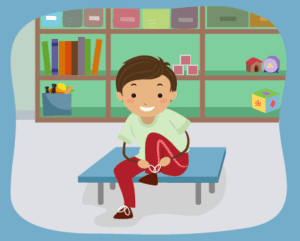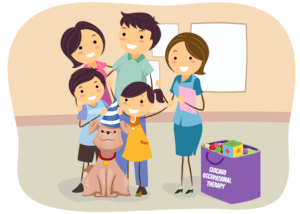Occupational therapists often assist children in tying their shoes as it requires a variety of skills such as bilateral coordination and visual motor skills that can often be difficult for children, especially those who experience delays in their motor skills. While this is a seemingly simple or trivial skill, learning to tie shoes can lead to a sense of independence for children.

Strategies to improve shoe-tying:
-
- Have your child start practicing with the shoe off rather than on as it is easier to learn with the shoe off
- Make sure you have your child practice with the heel closest to them and the toe pointing away this way it will be consistent for when they practice tying their shoes on their feet
- Use bicolored laces that are different colors – this helps your child to differentiate the two laces to help them learn and visualize each step easier
- Use longer laces when they are learning, shorter laces tend to be harder to manipulate
- Work on one step at a time – for example spend time just working with your child on making a “bunny ear” and once they master that you can work towards the next step
- Use a fun story or song to help teach your child the steps – they will likely remember a story or song that is fun and engaging. Click here for a website that has a variety of stories, poems, and songs that you can use to teach shoe tying!
- Avoid using the words “left” and “right” unless your child has a good understanding on what these words mean
- Try using other items rather than shoe laces at the beginning as shoe laces can be tricky to manage. For example, have your child practice with pipe cleaners or Wikki Stix
If your child is having trouble with tying shoes it can be due to difficulty with fine or visual motor skills, decreased hand strength, bilateral coordination, or sequencing. An occupational therapist can be helpful in building these skills to assist in your child to be more independent in tasks such as shoe tying!
Contact Chicago Occupational Therapy or call (773) 980-0300 to learn more about our services and how we can help your child flourish and grow.

